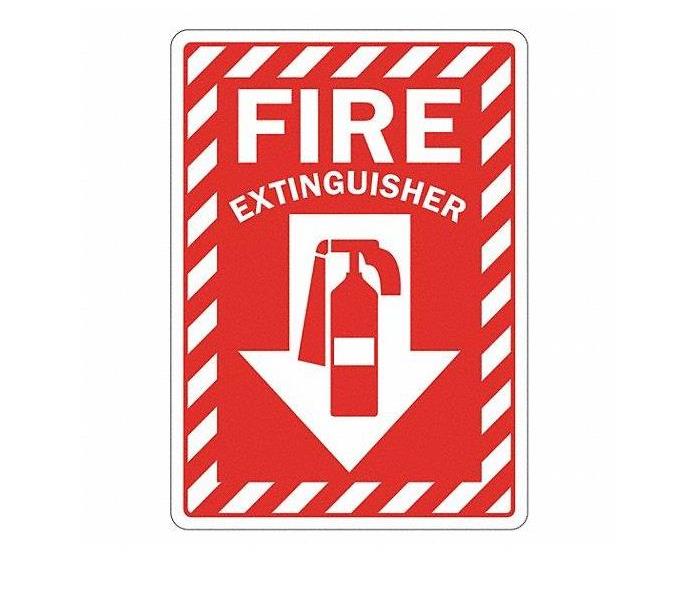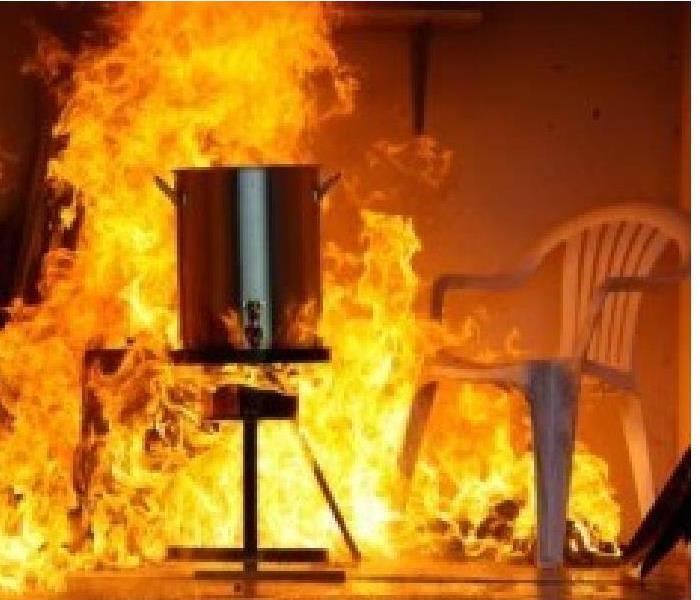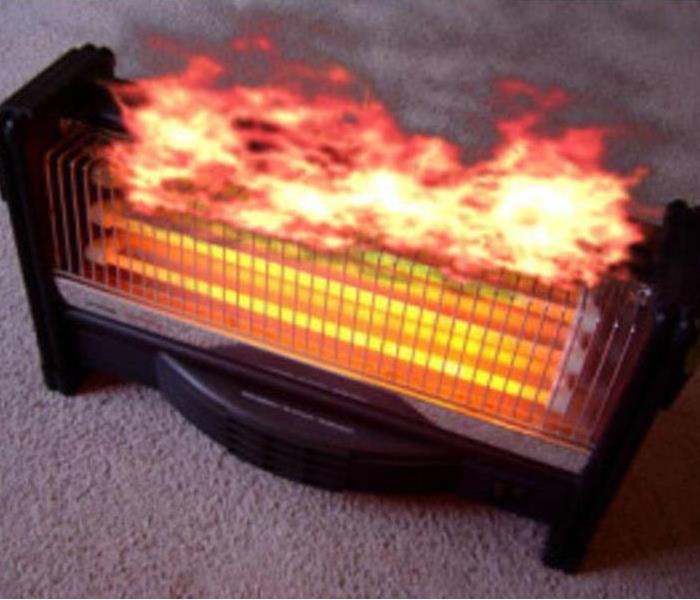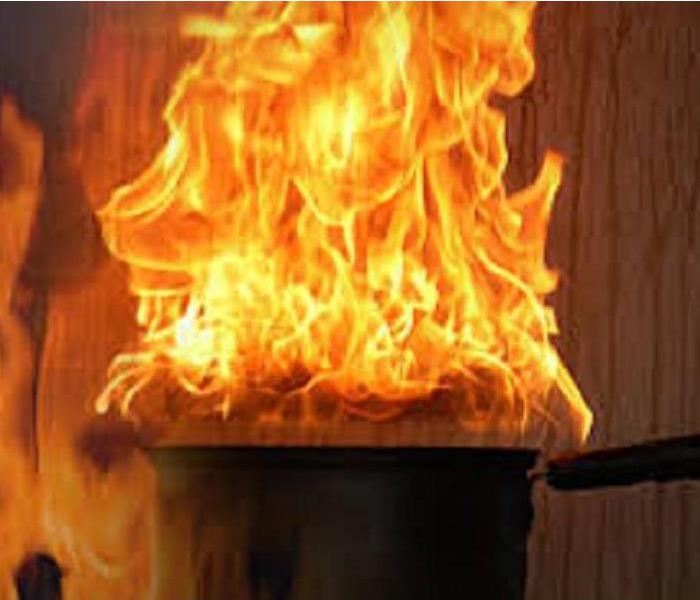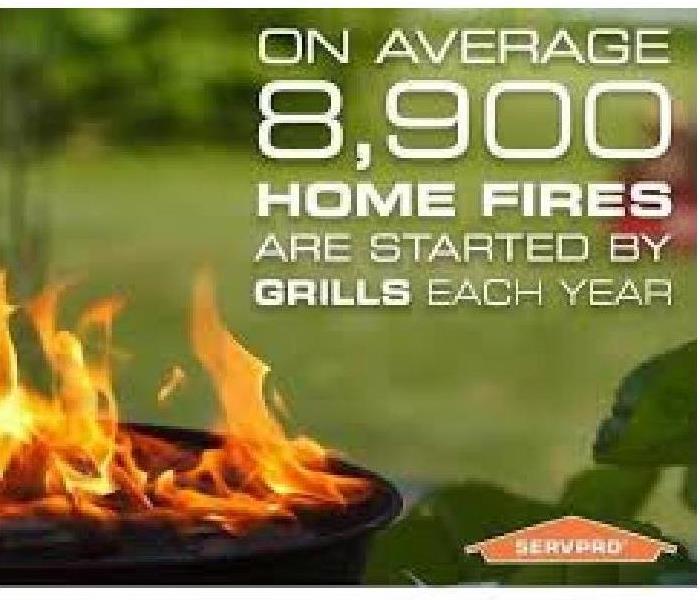Recent Fire Damage Posts
Christmas Tree Fires
12/1/2023 (Permalink)
According to the National Fire Protection Association, half of all Christmas tree fires are caused by either an electrical problem or a heat source too close to the tree. Below are some safety measures you can take to prevent these accidents.
- If purchasing an artificial tree, look for the label "Fire Retardant". This indicates that the tree will resist burning and extinguish quickly if an accident were to happen.
- When purchasing a live tree: - Make sure the needles are green and are hard to pull from the branches. - Look for one where the lower trunk is sticky with resin.
- Once the tree is in your home, place it away from fireplaces, radiators, portable heaters, heater vents, electronics, and electrical equipment. If it is a real tree, make sure to keep the stand filled with water.
Everyone have a safe and happy holiday season! Should an emergency happen, we are available 24/7 by calling 319-754-8050!
Protect Your Pets
11/14/2022 (Permalink)
Protecting your Pets
Your pets are a part of your family, and you surely would do whatever you can to keep them safe and out of harm’s way. To help keep all of your family safe from the dangers of a home fire, here are some important steps you should take to prepare for the possibility of a fire emergency in your home.
Fire Prevention
Your pets are not always aware of their surroundings and that their actions can result in a fire. Here are a few pet safety tips for preventing a fire:
- Don’t leave pets unattended near space heaters or an open flame
- Secure electrical cords that your dog might chew on
- Remove stove knobs or use safety covers. Never leave food on the stove unattended
- Consider flameless candles or other candle alternatives
Pet Fire Preparedness
Once you have set up your home to help your pets from starting a fire emergency, you then need to start on your pet evacuation plan. When developing an evacuation plan with your family, identify which member of the family will be responsible for helping your pets get to safety, and make sure your pet comes when called by that family member.
Place a pet alert window cling to a front window with information on all of your pets so firefighters can quickly find them.
While the saving your pets is important, make sure to you don’t delay your escape if saving your pet isn’t possible. Once out of the house, do not reenter, inform the firefighters of your pets and let the professional take the lead on finding your pets. Wait until the fire damage assessment team says your home is safe to enter before reentering the house.
Fire Pit Safety
10/3/2022 (Permalink)
Having family and friends around an outdoor fire pit is a great pastime as the temperatures begin to drop. Please ensure they are the good times by following these safety tips.
Check the weather. If winds greater than 15 MPH are in the forecast, do not ignite the fire pit at your gathering. Some fire pits are made to handle 20 to 25 MPH wind. Check with the manufacturer.
With weather permitting, start your fire pit and clear all brush from the area. No structures within 25 feet of the fire pit should be present.
The safest way to start a fire is with small kindling. If you must use charcoal lighter fluid, make sure to seal the container and keep it far away from the fire. Never use lighter fluid once the fire has started.
The size of a recreational fire should be no more than 3 feet in diameter and 2 feet high.
Keep a bucket of water or garden hose at the ready.
Never use an accelerant other than a lighter fluid.
Keep a safe distance from the fire, and don’t horse around.
Make sure to put the fire out completely. Stir the ashes and douse thoroughly with water.
Most cities do not allow open burning of garbage, but do permit fire pits. Check your local regulations.
Call SERVPRO of Burlington for all you Fire and Water Restoration needs at 319-754-8050!
Grilling Safety
7/8/2022 (Permalink)
July is the season for grilling outdoors throughout the Midwest and that means more accidental grilling fires. SERVPRO of Burlington responds to fire damage emergencies in Louisa, Henry, Des Moines, and Lee counties throughout the year and offer these tips for propane grill safety from the National Fire Protection Association
Propane Grills
- Check the gas tank hose for leaks before using it for the first time each year
- Apply a light soap and water solution to the hose
- A propane leak will release bubbles
- If your grill has a gas leak, by smell or the soapy bubble test, and there is no flame, turn off both the gas tank and the grill.
- If the leak stops, get the grill serviced by a professional before using it again
- If the leak does not stop, call the fire department
- If you smell gas while cooking, immediately get away from the grill and call the fire department.
- Do not move the grill.
- If the flame goes out, turn off the grill and gas and wait at least five minutes before re-lighting it.
Call SERVPRO!
Fire damage can happen at any time. When you need emergency fire damage restoration SERVPRO of Burlington is here to help. Our trained restoration technicians are on-call and ready to assist you 24-hours a day. Call us today at 319-754-8050. We’ll restore your fire damage, “Like it never even happened.”
Fire Extinguisher Usage
5/2/2022 (Permalink)
Things to Know When Using a Fire Extinguisher
The National Fire Protection Association recommends the following when operating a portable fire extinguisher.
To operate a fire extinguisher, remember the word PASS:
- Pull the pin. Hold the extinguisher with the nozzle pointing away from you, and release the locking mechanism.
- Aim low. Point the extinguisher at the base of the fire.
- Squeeze the lever slowly and evenly.
- Sweep the nozzle from side-to-side.
For your home, select a multi-purpose extinguisher (can be used on all types of home fires) that is large enough to put out a small fire, but not so heavy as to be difficult to handle.
Be sure to read the instructions that come with the fire extinguisher and become familiar with its parts and operation before a fire breaks out. Local fire departments or fire equipment distributors often offer hands-on fire extinguisher trainings.
Install fire extinguishers close to an exit and keep your back to a clear exit when you use the device so you can make an easy escape if the fire cannot be controlled. If the room fills with smoke, leave immediately.
Know when to go. Have a safe escape plan. Then call SERVPRO of Burlington to help cleanup and restore your home or business at 319-754-8050.
Washing Machine and Dryer Hazards
3/11/2022 (Permalink)
When a household fire occurs, it is important for the fire department to determine
the cause and origin of the fire. In this way, it may be prevented in the future. Unfortunately, an alarming number of fires were found out to be caused by clothes dryers or washing machines. The lint builds up in the dryer or the dryer vent which then keeps heat from flowing out, thus, resulting in a fire. Some washers have had wiring issues that have caused fires.
There are many brands whose washers and dryers have been recalled due to fire, burn, or shock hazards. The companies cooperate well enough to make the announcements, and have those units recalled, repaired, and to ensure that they manufacture better units in the future. It goes to show that cleaning the dryer vent is such an important task you need to include in your daily routine. If you want a more thorough cleaning, hire an expert to help you out. Call SERVPRO of Burlington!
Burning Fall Leaves Safely
12/6/2021 (Permalink)
While you certainly can burn leaves safely, it’s important to understand what’s okay to burn and what’s not. You should only burn debris from trees, including leaves, twigs, and smaller branches. These materials burn relatively quickly and retain very little heat when extinguished, making them safe to burn.
But by far, the greatest concern about open burning is its potential to quickly get out of hand quickly. An uncontained fire can grow out of control very quickly, with catastrophic results. In fact, humans cause nearly 85% of wildfires, many of which start as burning leaf piles.
Mulch Leaves Instead of Burning
Another option is to shred leaves for use as mulch for your lawn or to help protect garden and landscape plants. Lawn and garden specialist suggest adding no more than a two-to-three-inch layer of leaves around actively growing plants, chopping or shredding the leaves first so they don’t mat down and prevent air from reaching roots.
As to using leaves as mulch for your lawn, it is just a simple matter of mowing right over the leaves with the lawnmower and leaving them there. As with leaves used for garden mulch, this will provide many benefits, including weed suppression, moisture conservation and moderation of soil temperature.
Fall Home Maintenance
10/28/2021 (Permalink)
Seasonal home maintenance may not be the most exciting aspect of home ownership, but it is one of the most important. With the falling temperatures and falling leaves of the season, autumn brings its own unique challenges.
This fall home maintenance checklist from Travelers Insurance is a great resource for maintaining your home and preventing fire.
Your furnace should be cleaned and inspected annually by a qualified HVAC technician. Make sure the filter is cleaned or replaced.
Make sure anything flammable (from paint and chemicals to lawn and power equipment) is stored well away from water heaters and wiring.
According to the Consumer Product Safety Commission, there are, on average, over 26,000 chimney fires a year. Many of these fires could be prevented by having the chimney cleaned annually by a professional to removed creosote buildup.
Leaves can easily build up in your gutters or on the roof, creating a fire hazard. All it takes is a little spark, so be sure to clean your gutters and downspouts regularly.
In 2010, an estimated 16,800 home fires in the US were caused by clothes dryers and washing machines. Most of those involved clothes dryers, and many of them were due to buildup of dust and lint in the clothes dryer exhaust duct. Make sure to not only clean out the lint trap with each use, but also occasionally clean the dryer exhaust duct and behind/under the appliance as well.
Do a walk-through of your home, inspecting electrical outlets for frayed wires, loose-fitting plugs, and other potential fire hazards.
When using seasonal decorations, remember never to overload electrical outlets, fuse boxes, power strips, or extension cords.
Make sure you have a fire extinguisher easily accessible. They do expire after a few years, so be sure to check the expiration date to ensure it will actually work when you need it.
Have a smoke detector on each level of your home. Test your smoke detectors monthly, and be sure to change the batteries at least once a year.
SERVPRO of Burlington, 319-754-8050 for any fire and water restoration needs
Fire Restoration
9/29/2021 (Permalink)
SERVPRO of Burlington is here to Help Restore Your Home or Business after a Fire
The damage done is often severe and more pervasive than you might at first fear. Cleanup and restoration require a broad skill set and specialized equipment. Our team has the training, experience, and tools to quickly and efficiently turn a fire damage scenario back to preloss condition.
One consideration few business or homeowners fully understand before they experience fire damage is the severity of water harm to building structure and contents following a fire. Before our crews tackle the smoke, soot, and charring, we must be sure to remove the water used to extinguish the flames and then dry out your home. Water damage leads to secondary issues such as mold growth or progressive deterioration of the wood, metal, and other materials providing the structure of your home. Our highly qualified employees are adept at resolving water damage issues.
Once SERVPRO resolves the water damage, we move swiftly on developing and implementing a plan for the fire damage cleanup and restoration. The residues deposited on surfaces, fabrics, furnishings, and possession after a fire are highly acidic, corroding all they touch. Plastics discolor, metal and glass etch, and wood deteriorates. Evaluation of the safety of stored food in pantry areas and even refrigerators and freezers must occur.
Our crews know how to approach different types of soot, matching tools, and cleaning products to ensure a professional-grade effort. Our technicians are highly trained in Cleaning, and Restoration through (IICRC) classes. SERVPRO can inventory and pack out personal belongings and removable household goods and furnishings for targeted attention. Our experts can coax back to a previous condition many items a homeowner might discard, believing they are ruined. Utilizing our skills and experience saves time and money.
SERVPRO of Burlington is ready to prove the difference a full-spectrum restoration company can make when your home experiences fire damage. Call (319) 754-8050 to set up an inspection and develop a plan.
Summertime Fires
7/6/2021 (Permalink)
Summer is a time for fun, but it is important to make sure your family are being cautious when using fireworks, grills, and other potentially dangerous materials. Here are thing you need to know about keeping your family and home safe this summer!
July is the peak month for grill fires, including both structure, outdoor or unclassified fires, followed by May, June and August
Leaks or breaks were the factor in 11% of grill structure fires and 23% of outside and unclassified grill fires
Gas grills contribute to a higher number of home fires overall than their charcoal counterparts
A failure to clean the grill was the leading factor contributing to the fire in one –fifth of all grill structure fires. In other instances something that could catch fire was too close to the grill.
NFPA, National Fire Protection Association has great safety tips on a variety of fire and life safety topics. Check them out at www.nfpa.org.
Have fun and stay safe this summer!
Fire Damage to your Home
4/27/2021 (Permalink)
A house fire can be an upsetting event with the need to stay with friends, relatives or rent another home while the property is in under repair. If you're dealing with fire damage we are available to repair your home so that you can move back into it quickly and get your life back to normal. We specialize in cleaning and restoration of fire damage to help displaced families stop worrying and get back to living.
Our cleanup professionals have specific fire restoration training that meets or exceeds industry standards for all aspects of fire restoration. We make sure that your repair looks not only as good as it did before the fire, but also smells smoke free and is completely free of moisture or water damage. Whenever possible, our fire damage professionals will restore not only the structure of your home, but also any contents or family treasures that are salvageable. We understand that your cherished mementos are part of what made your house a home, and we'll save them whenever we can.
Afire can leave you feeling overwhelmed, but we're here to help 24 hours a day, seven days a week. You can contact us anytime you need us, day or night. Expect to hear from us within the hour and have a SERVPRO of Burlington fire damage cleanup professional on site within four hours. We will immediately examine your space and begin testing restoration treatments to give you a complete assessment of the scope of the job and the expected restorability of specific items. We may even generate a proprietary software program called the CCIS, the Contents Claim Inventory Service. This will itemize damaged articles and materials thereby helping you with the claims process.
Don't let fire keep you out of your home any longer than absolutely necessary. Instead, let our cleaning and restoration service help you get life back to normal for you and your family as quickly as possible. If you've experienced a fire, call SERVPRO of Burlington at (319) 754-8050 to get the help you need.
Fire Damage Restoration Services
3/8/2021 (Permalink)
Since each smoke and fire damage situation is different, each one requires a different solution tailored for the specific conditions. We have the equipment, expertise, and experience to restore your fire and smoke damage. At SERVPRO of Burlington we care about you and your family, and want to make this situation to be as painless as possible. We will treat you and your items with respect as if they were our own. If you find yourself dealing with the aftermath of a fire, give SERVPRO a call. We’ll restore the damage and make it “Like it never even happened.”
SERVPRO of Burlington specializes in the cleanup and restoration of residential and commercial property after fire damage. Our staff is highly trained in property damage restoration. From initial and ongoing training at SERVPRO’s corporate training facility to regular IICRC-industry certification, you may rest assured our staff is equipped with the knowledge to restore your property.
If you need help with cleaning up after water, fire, or mold damage, call the professionals at SERVPRO of Burlington.
319-754-8050
Protein Fires
11/25/2020 (Permalink)
With the holiday’s fast approaching be aware of what a protein fire can do.
Protein fires create an especially unique restoration challenge. Damage caused by burnt food can also create odor issues which are difficult to mitigate. Here is some important information regarding this type of fire.
- Protein fires generally leave little visible residue, often confusing the untrained observer.
- They create a significantly more repugnant smell than most other fires.
- The nature of the burn causes the odor to permeate structure and furniture even more completely than other fires.
- Requires extremely thorough cleaning to remove the odor
- They sometimes require a sealing agent or even repainting to completely eradicate the odor.
- May require multiple attempts and methods to achieve customer satisfaction.
It is also important to recognize that perception of odor is highly individual. There are no tools available to “measure” smell, and as a result, a homeowner may perceive odors that technicians or even neighbors cannot. The strong link between smell and memory, a homeowner may experience “phantom odors” where the memory of the event causes reproduction of the odor even after thorough cleaning.
SERVPRO of Burlington’s technicians have the proper training and equipment to mitigate the fire damage and make it smell like new. Have a safe and happy holiday season!
Smoke Detector Safety
10/28/2020 (Permalink)
Fall time change is a great time to change the battery in your smoke detector
When was the last time you tested your smoke alarm?
Smoke alarms can be a life saver. In a report from The National Fire Protection Association (NFPA), “three of every five home fire deaths resulted from fires in homes with no smoke alarms (38%) or no working smoke alarms (21%)”. This statistic alone is startling and shows the importance of having smoke alarms in your home or business. SERVPRO of Burlington has some helpful tips for how to properly install and maintain them to ensure the safety of you and your family.
- Alarms should be installed on the inside and outside of bedrooms.
- Install a smoke alarm on each level of your home.
- Use an interconnected alarm system which allows for all alarms in your home or business to sound off when one alarm is set off.
- Do not install a smoke alarm near your kitchen as you don’t want any false alarms such as smoke from burnt toast.
- Test all smoke alarms once a month to ensure they are running properly.
- Replace smoke alarm batteries at least once every year.
- Replace your smoke alarm every 10 years. Be sure to check the back of your alarm for the manufacturer’s date so you know when to replace.
Nearly 1628 deaths were reported between January 1, 2020 and October 23, 2020 from home fires in the United States. Be sure to take the proper precautions to protect you and the lives of those around you by adhering to the recommended safety tips listed above.
Attic Fires
9/29/2020 (Permalink)
Attic fires can happen at any time. The following are some tips you can follow to help prevent this kind of fire.
Some fire safety experts believe the installation of a whole house fan or attic fan may pose an increased risk for attic fires. That said, you may want to weigh the pros and cons of attic fan installation. If you cool your home with an attic fan, be sure it is constructed of quality material, such as metal. Plastic fan parts may pose a fire hazard. Inspect and clean yearly. If in doubt replace it.
Another tip for avoiding an attic fire is to simply clean up the area. This is especially true if you have a finished attic for storage use or one that is occupied for entertainment or sleeping purposes. Never leave appliances plugged in when they're not in use and don't overload your electrical outlets. Watch out for loose curtains or window furnishings that block vents. Don't store boxes or other items too close to a vent and, most importantly, do not store combustible items that may ignite in your attic.
Checking the electrical wiring and examining your chimney lining for flaws is another step that can help prevent an attic fire. Ensuring proper ventilation for your attic is also essential.
While you cannot entirely avoid the possibility of fires in your home, you do have a direct influence on the professionals selected to restore this damage fully after the incident. One of the key factors that can aid you in this choice is the team that can arrive whenever disaster strikes, with SERVPRO of Burlington’s 24-hour response that features the full measure of skilled professionals and advanced equipment to lessen the loss in your home in this troublesome time.
Fire Restoration
7/6/2020 (Permalink)
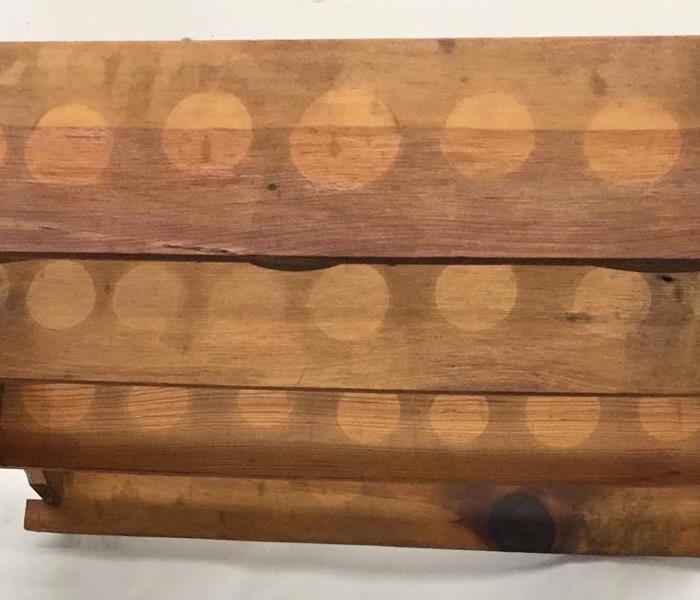 This shelf you may think is covered in dirt but was actually in a fire and got covered with soot.
This shelf you may think is covered in dirt but was actually in a fire and got covered with soot.
Eliminate the soot damage that can occur throughout your home after a fire with the help of SERVPRO of Burlington.
We are here to help to get you back to preloss condition after fire damage.
Having a fire in your home opens up a range of feelings and fears. It is unlikely the average homeowner possesses much experience in responding to fire damage. The immediate aftermath does not afford you the time to learn all that is necessary to return a home to pre-fire condition. Our seasoned fire damage restoration crews have the training and the equipment needed for a fast and comprehensive recovery.
Restoration of your fire damaged property can be challenging. Not only does the charring, soot, and smoke damage require attention. The water and chemicals that extinguished the fire also threaten the integrity of your home’s structure. Our full spectrum of services includes industry best practices in water removal and applied drying techniques. Before we focus on the fire issues, safety concerns rooted in the slip and fall and electrical shock problems water brings need resolution.
SERVPRO crews then turn to proven measures to halt the progressive damage smoke and soot inflict on structural components and contents. Fire damage requires speedy action as well. Within hours, materials warp and discolor. Glass and metals etch. Fabrics and wood deteriorate. The soot and smoke invade every space inside a home, causing the acidic components to attack surfaces and possessions.
Deodorization is crucial in a fire damage project as the combustion of a wide range of materials causes layers of unpleasant smells. Our odor remediation specialists use SERVPRO products and methods to neutralize smells. We clean, seal and using advanced technologies to eliminate odors.
Should a fire happen to you give us a call at 319-754-8050!
Grass Fire Preparedness
4/27/2020 (Permalink)
Flying embers from a grass or wildfire can destroy homes. Taking the necessary measures to prepare your home can help increase its chance of survival when grass or wildfires strike. The following are some ways you can prepare or build your home and make it more fire resistant.
- Roof- The roof is the most vulnerable part of your home. Homes with wood or shingle roofs are at high risk of being destroyed during a grass fire. Build your roof or re-roof with materials such as composition, metal, or tile. Block any spaces between roof decking and covering to prevent embers from catching.
- Vents- Vents on homes create openings for flying embers. Cover all vent openings with 1/16-inch to 1/8-inch metal mesh. Do not use fiberglass or plastic mesh because they can melt and burn.
- Windows- Install dual-paned windows with one pane of tempered glass to reduce the chance of breakage in a fire. Consider limiting the size and number of windows that face large areas of vegetation.
- Walls- Wood products, such as boards, panels or shingles, are common siding materials. However, they are flammable and not good choices for fire-prone areas.
- Decks- Surfaces within 10 feet of the building should be built with ignition- resistant, non-combustible, or other approved materials. Also, ensure that all combustible items are removed from underneath your deck.
- Garage- Have a fire extinguisher and tools such as a shovel, rake, bucket, and hose available fore fire emergencies. Install weather stripping around and under the garage door to prevent embers from blowing in. Store all combustible and flammable liquids away from ignition sources.
These are just a few things you can do to protect your home. Stay safe and be smart when burning outside!
Importance of Maintaining your Smoke Detectors
3/6/2020 (Permalink)
As daylight saving time approaches this weekend it is recommended you check your smoke detector batteries and change them if needed. Smoke alarms that are properly installed and maintained play a vital role in reducing fire deaths and injuries. The following is some information from the NFPA (National Fire Protection Association) on the importance of having and maintaining your smoke detectors.
- A closed door may slow the spread of smoke, heat and fire. Install smoke alarms in every sleeping room and outside each separate sleeping area. Install alarms on every level of the home.
- Smoke alarms should be interconnected. When one sounds, they all sound.
- Large homes may need extra smoke alarms.
- Test your smoke alarms at least once a month. Press the test button to be sure the alarm is working.
- Today’s smoke alarms will be more technologically advanced to respond to a multitude of fire conditions, yet mitigate false alarms.
- When a smoke alarm sounds, get outside and stay outside.
- Replace all smoke alarms in your home every 10 years.
According to the NFPA, in fires which the smoke alarms were present but did not operate, more than two of every five of the smoke alarms had missing or disconnected batteries. This is why it is extremely important to inspect and maintain your smoke detectors.
Thanksgiving Cooking Fires
11/27/2019 (Permalink)
According to the National Fire Protection Association (NFPA) Thanksgiving is the peak day for home cooking fires. In 2017, U.S. fire departments responded to an estimated 1,600 home cooking fires on Thanksgiving. Following are some tips from the NFPA on how to stay safe and prevent a fire from ruining your holiday.
- Stay in the kitchen when you are cooking on the stove top.
- Stay in the home when cooking your turkey, and check on it frequently.
- Make sure children stay away from the stove.
- Keep knives out of the reach of children.
- Be sure electric cords from an electric knife, coffee maker, plate warmer or mixer are not dangling off the counter within easy reach of a child.
- Keep matches and utility lighters out of the reach of children.
- Keep the floor clear so you don’t trip over kids, toys, purses, or bags.
- Make sure your smoke alarms are working. If not, your batteries may need changed.
We hope you have a safe Thanksgiving but if a fire should happen to you over the holidays don’t hesitate to call the professionals at SERVPRO of Burlington. We are available 24/7 to assist you!
Getting your Home Winter Ready
10/30/2019 (Permalink)
Although we are still in the fall season it’s never too early to think about getting your home winter ready. The following tips will help you prepare to ready your home for when that cold and blustery winter weather arrives.
- Check your home’s heating and air conditioning system- It is recommended to change your filter at this time so your furnace can continue to run smoothly.
- Caulk around windows and doors- If the gaps between siding and window or door frames are bigger than the width of a nickel, you need to reapply exterior caulk. Also, make sure to check the joints as well.
- Check your drainage- Check and make sure the soil around your foundation hasn’t settled. This can cause water to pool and eventually end up in your basement causing a bigger problem.
- Clean your gutters- Once your trees are pretty much free of leaves tend to your gutters. A clogged gutter can cause any moisture such as rain and snow to run down the side of your home, speeding up the deterioration of your exterior.
- Clean your chimney and order firewood- Keeping your chimney and vents clean with help prevent chimney fires and also helps to prevent carbon monoxide from creeping into your home.
- Test your smoke and carbon monoxide detectors- Now is a good time to change those batteries to ensure they are in good working order.
- Drain outside faucets- If there is no water in the lines than you won’t run into the issue of them breaking and causing an even bigger problem.
- Last but certainly not least, restock winter essentials such as salt or ice melt.
Burning Leaves Safely
10/2/2019 (Permalink)
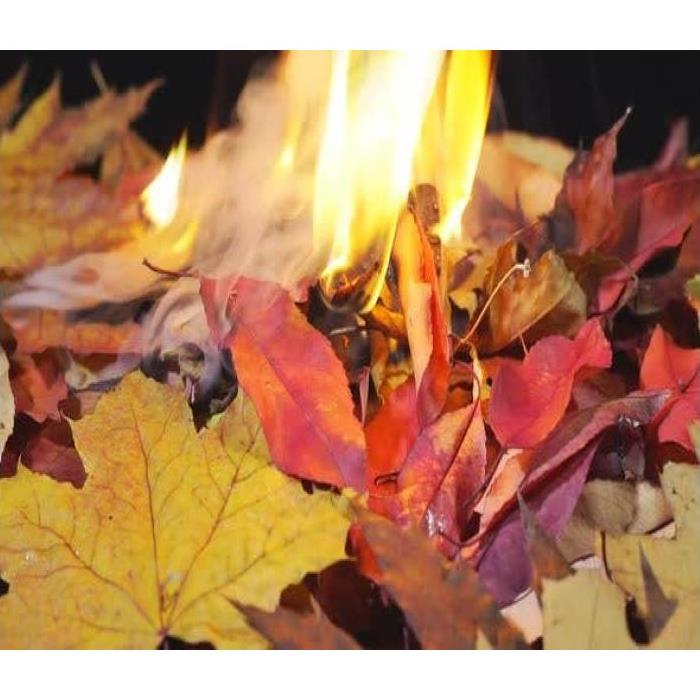 Burning Leaves
Burning Leaves
Fall is finally upon us after a rainy and hot summer. This time of year means leaves falling from the trees and piling in your yard. The following are some tips to follow if you want to take the route of burning your leaves.
- Contact the fire department to see if there is a good day to burn and if you need to obtain any special permits as each town is different. A good rule of advice to follow is to only burn when skies are clear and wind speed doesn’t exceed 15 miles per hour.
- Rake the leaves into a manageable pile with 6 feet clear in every direction. Light a small branch with a match and then place it among the leaves. It is not advised to use gasoline or fire starters to ignite leaves as it can sometimes cause a large unmanageable fire.
- Constantly supervise and keep a garden hose and/or a multipurpose fire extinguisher just in case the fire gets out of hand.
- Hose the fire down once it burns out just to make sure you put out any embers that might still be glowing.
- Once the fire is completely out gather up the ash safely and properly dispose of it. You can place the ashes in a metal container to reduce the risk of an out of control fire.
Have a safe and fun fall!
Charger Fires
7/9/2019 (Permalink)
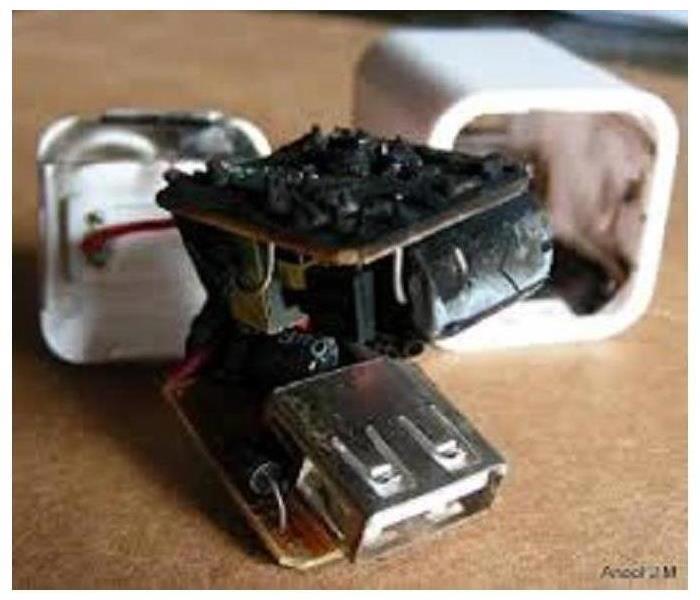 This is a phone charger that was plugged in and shorted out causing this to happen.
This is a phone charger that was plugged in and shorted out causing this to happen.
Let’s talk about phone charger safety for a minute. While I know it is convenient to leave your charger plugged into the wall at all times it is typically not recommended. Even when they are not being used they are constantly drawing power and this could lead to a small chance of a fire due to either heat buildup or short circuit. Although this tends to happen more when a charger is being used. Another way this can happen is if there is an excess amount of moisture in the air which can short circuit the transformer. Not only can this create a fire hazard it also wastes energy which in turn means you are paying for electricity you are not really using.
Should you want to leave them plugged in it is recommended to use a power strip as they work as surge protectors and you can turn them off when not in use. Another important thing to consider is when you are charging make sure you allow for adequate ventilation so they don’t overheat. It is not recommended to charge them under a pillow, on a bed, or on a couch.
Thanks to SERVPRO of Dubuque for the picture!
Garage Fires
4/24/2019 (Permalink)
In our area we have seen an increase in garage fires. Every year, there are 6,600 garage fires in homes that result in an average of $457 million in property loss with the leading cause being electrical malfunction. The following are some tips to follow to help prevent a garage fire from happening to you.
- Store oil, gasoline, paints, propane and varnishes in a shed away from your home.
- Keep items that can burn on shelves away from appliances.
- Plug only one charging appliance into an outlet.
- Don’t use an extension cord when charging an appliance.
- Keep the garage tidy and remove clutter.
- Install a heat alarm as these will sound if the temperature rises too high.
- Do not use or install solid-fuel burning devices such as wood, pellet, or coal in garages where gasoline and other flammable vapors may be present.
Daylight Saving Time
3/6/2019 (Permalink)
According to the National Fire Protection Association, almost two-thirds of home fire deaths resulted from fires in properties without working smoke alarms. Also, 71% of smoke alarms that failed to operate had missing, disconnected or dead batteries. A good way to remember to check them is to do it when Daylight Saving Time starts and ends since you have to change your clocks forward or backward. Also at these times it is important to check your carbon monoxide detectors, if you have them, and change batteries if needed. So, this weekend when we Spring forward check your smoke detectors and change batteries if needed. Smoke alarms play a vital role in reducing deaths and injuries as long as you properly maintain them. Check those detectors and don’t forget to spring forward an hour this weekend!
Heating Safety Tips
12/26/2018 (Permalink)
According to the National Fire Protection Association, half of home heating equipment fires are reported during the months of December, January, and February. The following are some tips from the NFPA to help prevent these kinds of fires.
- Keep anything that can burn at least three feet away from heating equipment, like the furnace, fireplace, wood stove, or portable space heater.
- Have a three-foot "kid-free zone" around open fires or space heaters.
- Never use your oven to heat your home.
- Have a qualified professional install stationary space heating equipment, water heaters, or central heating equipment according to the local codes and manufacturer's instructions.
- Have heating equipment and chimneys cleaned and inspected every year by a qualified professional.
- Remember to turn portable heaters off when leaving the room or going to bed.
- Always use the right kind of fuel, specified by the manufacturer, for fuel burning space heaters.
- Make sure the fireplace has a sturdy screen to stop sparks from flying into the room.
- Test smoke alarms at least once a month.
Space Heater Safety
12/20/2018 (Permalink)
While space heaters can help save you money on your energy bills there are a few things you need to keep in mind when deciding to go this route.
- Buy a space heater that is rated for your need. A heater that is too large for a certain area can lead to higher energy bills due to it consuming lots of energy. On the other hand, if you buy one that is rated too small for your space it will have to work harder to heat the space.
- It's suggested that you place your space heater at least three feet away from furniture, window treatments, bedding, clothing, rugs, and other combustibles. There is a chance a fire can start if these items touch the heating element of the space heater. Also make sure to place the space heater on a hard level surface so there is less chance of it tipping over.
- Make sure the heater you purchase carries a label from either UL, ETL, or CSA. These are safety consulting and certification companies.
- It is a good idea to purchase a space heater that has tip-over and overheat protection. A heater that has tip-over protection will automatically shut off if it tips over for any reason. Overheat protection is when the space heater uses a temperature sensor and when an unsafe temperature is detected, there is a switch that automatically shuts off the unit.
- Plug the space heater directly into an outlet instead of an extension cord. There is an increased risk of fires if plugged into an extension cord.
- Frequently clean and maintain it to ensure it's working safely. Wiping it down is also important as this helps reduce the amount of dust and allergens that can spread.
- Turn off and unplug the space heater if not in use to reduce the chance of a fire.
- Last but not least keep heaters away from water such as in a bathroom or a damp basement.
Smoke and Soot Damage
7/28/2018 (Permalink)
Not only can a fire cause damage to your home but smoke and soot can as well. During a fire and minutes after it has been extinguished, soot and smoke can spread quickly throughout your home and settle. If not responded to immediately it can discolor certain items and stain. Wood may need refinishing. Walls will begin to yellow and not only that but your clothes might be permanently stained. The restoration process becomes more difficult if your house/items are left untreated for weeks. Another important thing to consider is that the chemicals from whatever went up in flames can be detrimental to your health.
While a fire can be devastating let us here at SERVPRO of Burlington help make it "Like it never even happened." Our IICRC technicians are certified in fire restoration and will handle your home with professionalism and care.
SERVPRO of Burlington
319-754-8050
Grease Fires
6/25/2018 (Permalink)
Grease fires are the most dangerous when it comes to cooking fires and are responsible for 1 in every 5 home fire deaths. I will give you some tips on how to prevent and put out grease fires. These tips could help save your or a loved one's life.
Prevention
- Before you start cooking make sure burner is cool and wipe up any spills.
- Pay attention to heat ratings for cooking oil. Some oils can be heated more than others before catching fire so if you are cooking and notice the oil start to smoke that means it is close to catching fire.
- As soon as you start to see it smoke carefully remove the pan from the heat source.
- Avoid heating grease before putting food into it because when you drop food in it can make the grease splash out which in turn can cause grease burns or it can also hit the heat source and catch fire.
- Carefully clean spills as soon as they happen by first removing food from heat source, turning off heat source, and waiting for burner to cool.
- When deep frying make sure you use a pan or cooking container big enough.
- Use a utensil that will allow you to put the food into the grease without dropping and without your hands coming close to the hot grease.
- Use a screen that covers the pan to reduce the chance of splatters outside the pan.
- If you are a new or inexperienced cook do not attempt to deep fry for the first time unless you have an experienced cook with you.
- NEVER add water to grease.
Putting out a grease fire
- Turn off source of heat
- Do NOT pour water on it. Water and oil do not mix and when you add water it will sink right to the bottom and evaporate instantly, spreading flaming oil everywhere.
- Attempt to remove all oxygen from the flame. Cover with another pot or baking pan.
- If you can't cover it, dump lots of baking soda on it.
Grilling Season
4/25/2018 (Permalink)
With the warmer weather comes grilling season and therefore an increased chance of fires. According to the National Fire Protection Association, on average 8,900 home fires are started by grills each year. These type of fires peak in July, followed by May, June, and August. The following are some tips to help keep this type of fire from happening to you.
- Propane and charcoal grills should only be used outdoors
- They should be placed away from the home or deck railings, and out from under eaves and overhanging branches
- Children and pets should be at least three feet away from the grill area
- Clean your grill regularly
- Never leave your grill unattended while cooking
- Check regularly for gas leaks
- Don't move the grill once it is lit
- Wait until the grill is cooled before storing or covering
Should your house catch on fire due to a grill, call the professionals at SERVPRO of Burlington. We are available 24/7 to respond to your home and can help get your property back to pre-fire condition.
319-754-8050
Smoke Detectors Can Save Lives
3/19/2018 (Permalink)
Research on fires has demonstrated that fires can spread much more quickly today due to modern furnishings than in the past when more natural materials were used. Due to this it is important to have the right number of smoke alarms that are placed properly throughout your home so you have ample time to escape should a fire happen to you.
According to the U.S. Fire Administration, three out of five home fire deaths result from fires in properties without working smoke alarms. More than one-third of home fire deaths result from fires in which no smoke alarms are present. The risk of dying in a home fire is cut in half in homes with working smoke alarms.
Here is some useful information when it comes to installing smoke alarms in your home:
- Ideally you should install smoke alarms inside each bedroom and on every level of the home, even the basement
- Smoke alarms should be installed at least 10 feet away from a cooking appliance to minimize false alarms
- Mount smoke alarms high on walls or ceilings
- Installing smoke alarms near windows, door, or ducts may cause drafts to interfere with their operation
- Never paint smoke alarms
- Keep manufacturer's instructions for reference
- Test smoke alarms at least once a month using the test button. If the alarm chirps on a smoke detector with a non-replaceable 10 year battery you need to replace the entire smoke alarm right away. Other smoke detectors need a new battery at least once a year and if they start chirping replace the battery right away.
- Last but not least make sure everyone in your home understands the sound of the smoke alarm and knows what to do in case it sounds
Fire Preparedness
2/6/2018 (Permalink)
Fires can be devastating when they happen to you or a loved one. In a matter of mere minutes a residence can be engulfed in flames. Here are some tips to help you prepare ahead of time so you know what to do just in case a fire happens to you.
1. Make sure you install smoke alarms on every level of your home and check them monthly to make sure they work properly
2. Have a working fire extinguisher
3. Keep matches and lighters up high away from children and make sure they know what a smoke alarm sounds like and what to do when it goes off
4. Plan two escape routes and a meeting spot outside the home and make sure all household members know this information. Practice escaping twice a year.
5. Make sure everyone knows how to call 9-1-1
6. Take pictures to document what you own so you can show the insurance company in case a fire happens to you
7. Sleep with your door closed
8. Teach household members to stop, drop, and roll if their clothes should catch on fire
Winter House Fires
2/5/2018 (Permalink)
December, January, and February are the peak months for heating fires. There are things that you can do to prevent these fires from happening to you. Make sure you blow out candles when you leave a room and keep them out of reach of children and pets. If you use a space heater make sure you plug it directly into an outlet and not an extension cord. Also make sure to keep them away from curtains, bedding, and furniture. Don't leave your oven unattended when cooking or use it to heat your house. Last but not least don't forget about items in your garage and if you're able to; store flammable items in a shed away from the home. If unable to do that you can install a heat alarm that will sound if the temperature raises too high. Stay safe this winter!
What Does Soot and Smoke do?
7/26/2017 (Permalink)
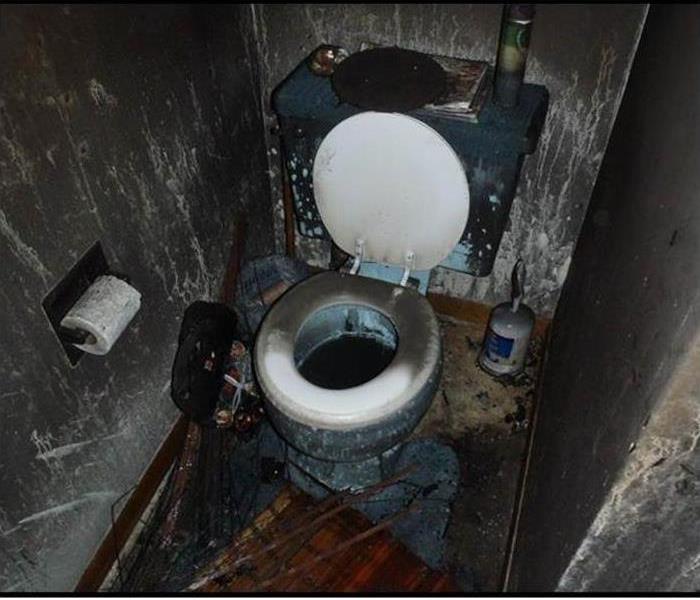 This is a heavily soot saturated bathroom
This is a heavily soot saturated bathroom
Smoke and soot is inevitable when there is a fire and it often causes just as much damage. Soot begins to settle into the structure and its contents nearly immediately. It can discolor certain items and stain if action is not taken quickly. Within hours of a fire, the damages become more difficult to restore. Wood may need refinishing, walls begin to yellow, and clothing might be permanently stained. If the house/items are left untreated for weeks, they become more permanently damaged and restoration the process becomes increasingly difficult.
Fires can be devastating and life changing. Let the SERVPRO professionals make it "Like it never even happened." Our IICRC technicians are certified in fire restoration and will handle your home with professionalism and care.
SERVPRO of Burlington 319-754-8050
Kitchen Fire Facts
7/19/2017 (Permalink)
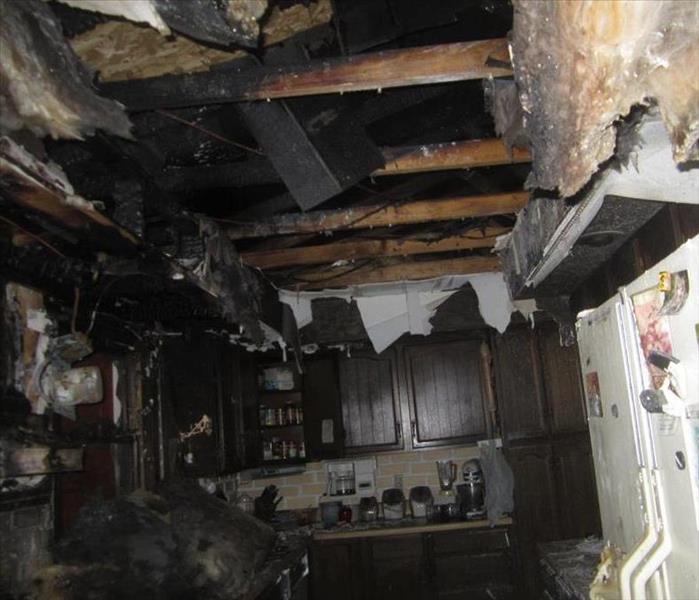 This photo shows a kitchen fire loss that caused extensive damage.
This photo shows a kitchen fire loss that caused extensive damage.
According to the National Fire Protection Association, from 2010-2014 firefighters responded to an estimated 166,100 home fires caused by cooking or involving cooking equipment. The leading cause of these fires included unattended cooking. As a result there were 480 civilian deaths and 5,540 injuries. NFPA also reports that cooking fires accounted for 1.1 billion dollars of direct property damage. It is alarming how fast a kitchen fire can start and then spread throughout your home. The damages usually extend to the entire house even when the source is isolated to one part of the house. Smoke and soot will travel to all areas of the structure. When a fire starts, it is crucial to protect yourself and call 911 or your local fire department. Injuries are likely to occur when you try to fight the fire on your own. Always be careful when cooking to be watchful of burners. Don't leave cooking food unattended and stay safe.






 24/7 Emergency Service
24/7 Emergency Service
